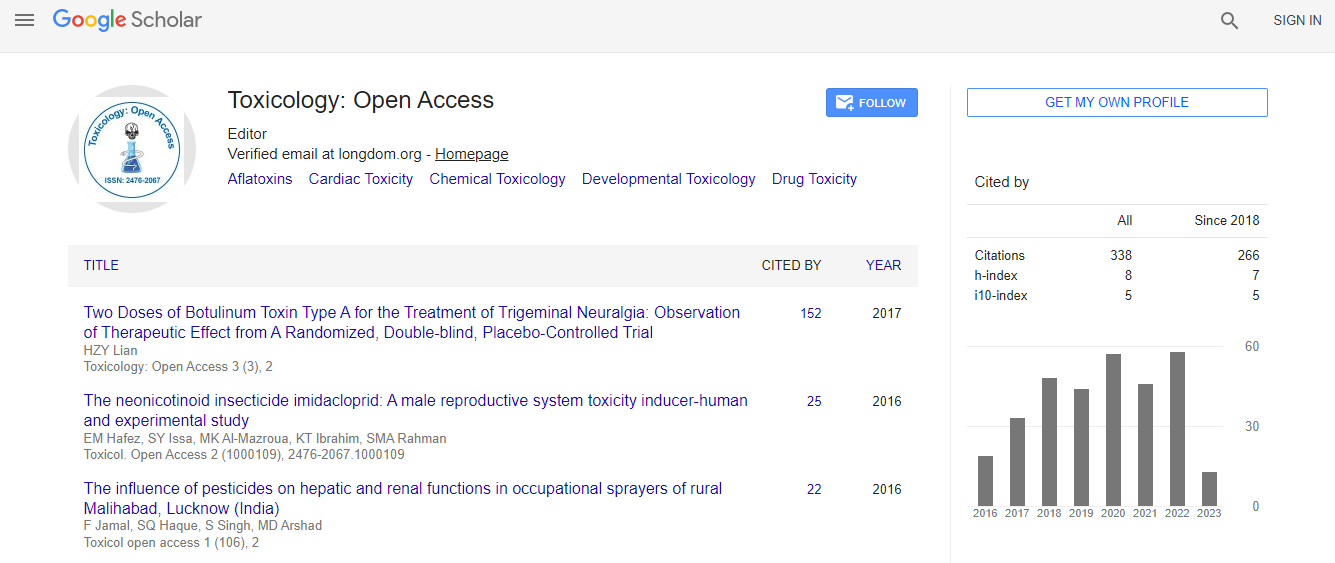Our Group organises 3000+ Global Conferenceseries Events every year across USA, Europe & Asia with support from 1000 more scientific Societies and Publishes 700+ Open Access Journals which contains over 50000 eminent personalities, reputed scientists as editorial board members.
Open Access Journals gaining more Readers and Citations
700 Journals and 15,000,000 Readers Each Journal is getting 25,000+ Readers
Google Scholar citation report
Citations : 336
Toxicology: Open Access received 336 citations as per Google Scholar report
Indexed In
- Google Scholar
- RefSeek
- Hamdard University
- EBSCO A-Z
- Geneva Foundation for Medical Education and Research
- Euro Pub
- ICMJE
Useful Links
Related Subjects
Share This Page
Determination of Bromate, Perchlorate and selected ions in drinking water supplies in Qatar
8th World Congress on Toxicology and Pharmacology
Sabah Mariyam, Ipek Goktepe and Aishah Binti Lathiff
Qatar University, Qatar Anti-Doping Lab, Qatar
Posters & Accepted Abstracts: Toxicol Open Access
Abstract
About 99% of the potable water used in Qatar is desalinated and Qataris spend approximately 15 million dollars in importing bottled water (90 million L), as the public thinks it is of better quality than the tap water. Since both tap and bottled water are stored in plastics, there are certain factors (e.g. temperature and UV light) which might affect their quality. Till now, there is no study available on the quality of drinking water in Qatar. This study is focused on analyzing the selected ions along with the toxic Bromate and Perchlorate ions in tap water collected from different locations in Qatar and five commonly consumed bottled water brands. The water samples were analyzed using the Dionex Ion Chromatography ICS 5000+. The concentrations of selected ions (ammonium, bromide, calcium, chloride, fluoride, lithium, magnesium, nitrate, nitrite, potassium, sodium and sulfate) were found to be below the set standard levels. The toxic Bromate and Perchlorate were not detected in any of the water samples tested in this study. However, the concentration of phosphate ions in all tap water and 5 bottled water brands ranged from 0.37-0.69 ppm which is above the standard (0.1 ppm) set by the Water Authority in Qatar, indicating that phosphates might have been added to drinking water to avoid corrosion in pipes. In conclusion, both tap water and bottled water brands studied are safe for consumption with respect to all ions. However, more research needs to be carried out to collect samples from the same locations during different times of the year to determine the impact of environmental factors on the formation of toxic Bromates and Perchlorates. Additionally, the public in Qatar should be encouraged to drink tap water since its quality is very much comparable to the bottled water, in contrast to their beliefs.Biography
Sabah Mariyam is a Bachelor’s student of Environmental Sciences Program at the Department of Biological and Environmental Sciences, College of Arts and Sciences, Qatar University. Her graduation project, funded by Qatar University Student grant, focuses on the quality of drinking water supplies in Qatar and this abstract is part of that project. She aims to encourage and change the general public perceptions on tap water quality in Qatar. She will be pursuing her Master’s degree in Environmental Sciences upon graduation.
Email: ss1302898@qu.edu.qa

 Spanish
Spanish  Chinese
Chinese  Russian
Russian  German
German  French
French  Japanese
Japanese  Portuguese
Portuguese  Hindi
Hindi 